We may earn a commission when you click on the affiliate links in this post.
Do you also dream of bright, fresh and flavorful homemade canned peaches? Look no further, we’re sharing our Mom’s recipe (and tips) for canning peaches at home.
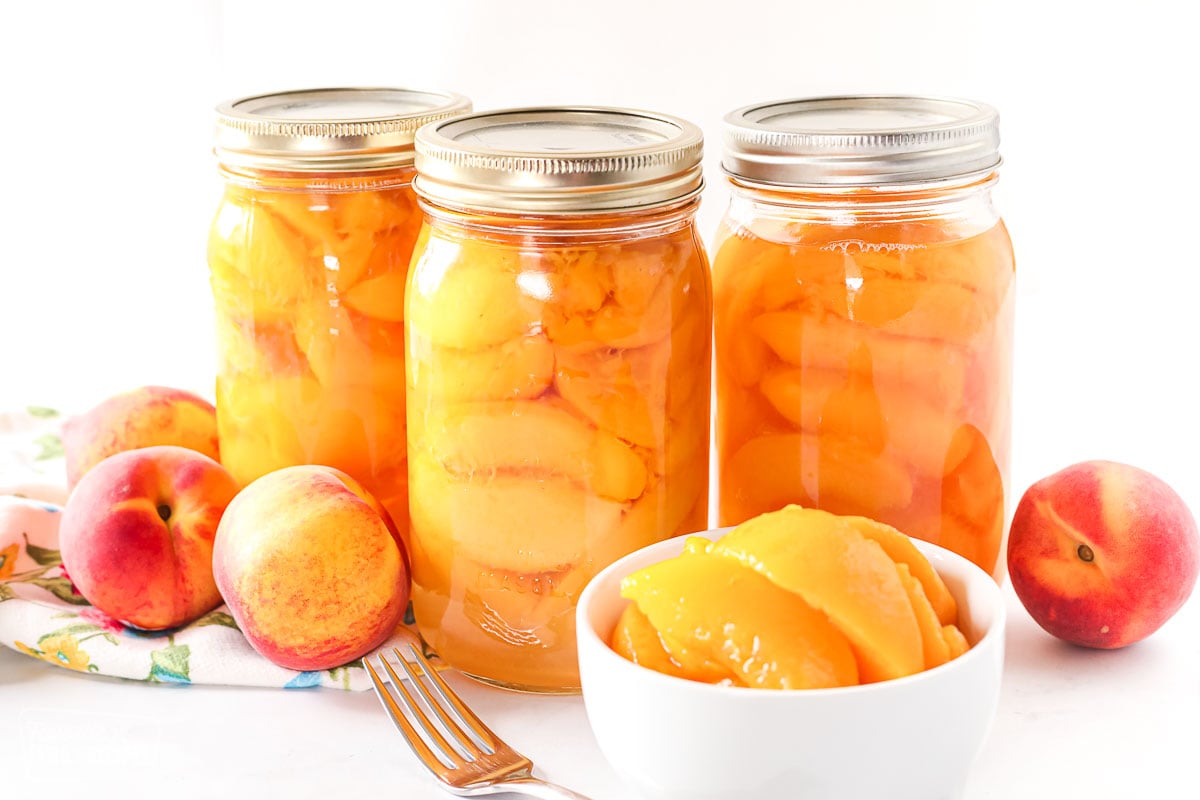
Featured with this Recipe
- Canning Peaches
- Ingredients Needed for Canning Peaches
- What are the Best Peaches for Canning?
- Canning Peaches in Light Syrup
- Sterilizing the Canning Jars
- Do Peaches Need To Be Pressure Canned?
- Tips For Canning Peaches
- Questions About Canned Peaches
- Recipes Using Peaches
- How to Can Peaches
- Canning Peaches at Home Recipe
Canning Peaches
During the cold winter months, when fresh fruit is hard to come by, these peaches are so refreshing and the bottles disappear quickly. Peaches contain a bounty of antioxidants which keep the skin clear and slow down the aging process.
If you’re a beginner in canning peaches and home food preservation, this is a great easy-to-follow complete guide with tips, tricks and recipes! Canning peaches at home preserves the taste, texture, and quality of fresh peaches.
This recipe uses the raw pack canning method, where the peaches are blanched, skinned, sliced and canned in a hot syrup. Another method for canning peaches is the hot pack method, where peaches are cooked for 5 minutes before they are canned. We prefer the raw pack canning method because it is quicker and easier – and you don’t have to handle hot peaches.
Ingredients Needed for Canning Peaches
- ripe peaches – large
- lemon juice
- water
- sugar
- Fruit-Fresh
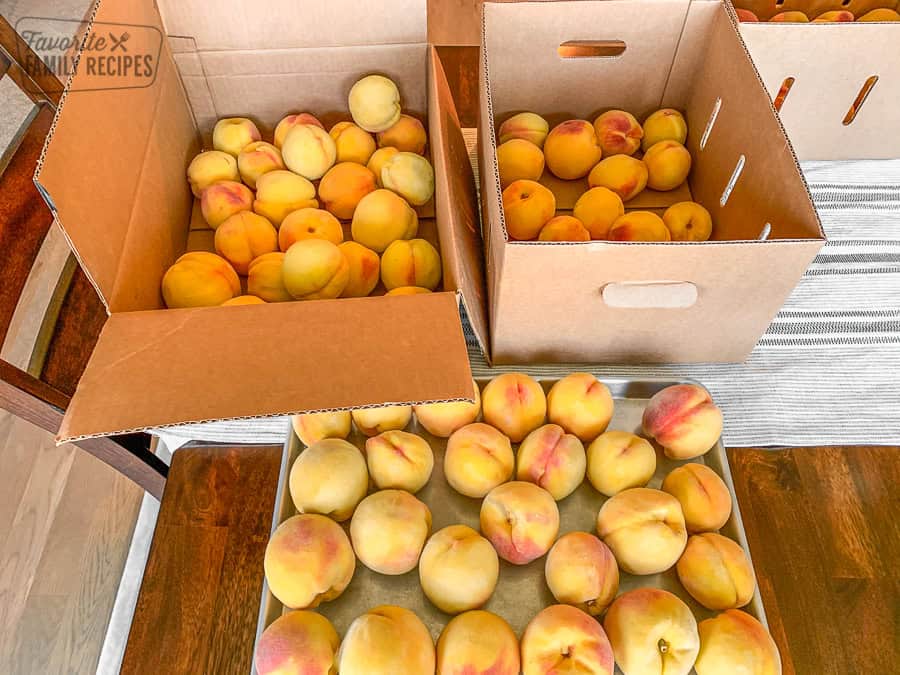
What are the Best Peaches for Canning?
I like to use the Elberta peaches that come on in September. They are a freestone variety and are easy to work with. Free-stone peaches slip right away from the pit, or stone. Clingstone peaches need to be cut away from the pit, which isn’t a problem either, it just takes a little more work. This recipe works with any traditional yellow varieties of peaches. Do not use white-flesh peaches with this canning method. According to the National Center for Home Food Preservation, white peaches are lower in acid than yellow peaches and are not safe to can.
The most important thing is to use ripe peaches. If the peach is hard and greenish in color, wait a day or two to do your canning. I often can the ripe ones the first day and wait a day or two to can the rest when they have ripened.
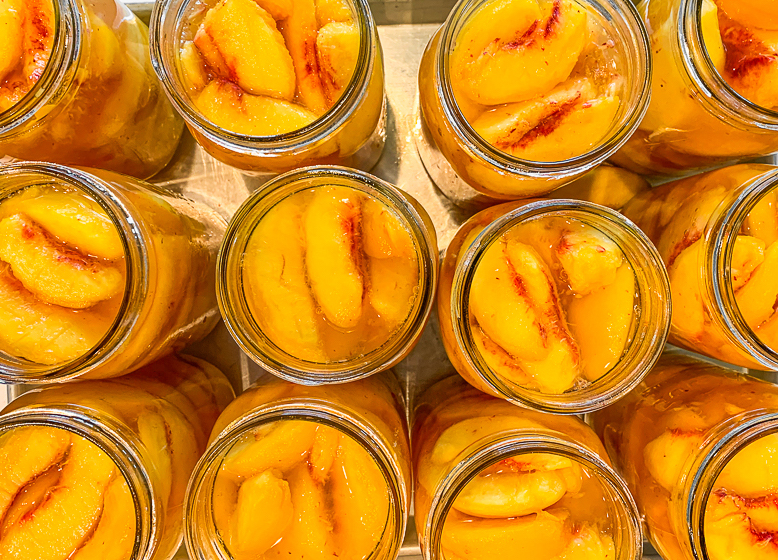
Canning Peaches in Light Syrup
A light sugar syrup is really the best for canning peaches. Too much sugar can overpower the fresh flavor of the peaches. For my recipe, I use a 2:1 water to sugar ratio. I also use Fruit-Fresh, which contains citric acid, to keep my peaches looking bright and to prevent browning. I use 1 teaspoon of Fruit-Fresh per cup of syrup.
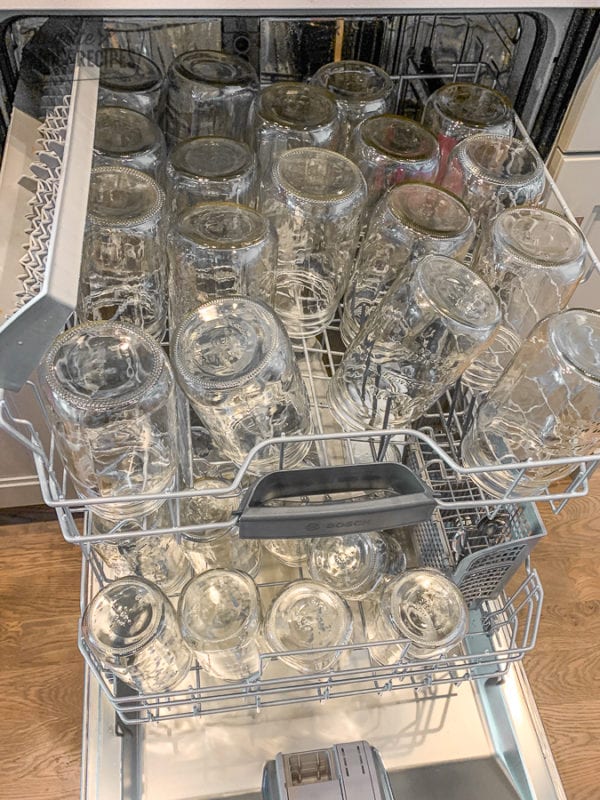
Sterilizing the Canning Jars
The best and easiest way I have found to sterilize my glass bottles for canning is to run them through a normal dishwasher cycle. I place the canning jar lids in a pot of warm water and simmer them until I’m ready to use them.
Do Peaches Need To Be Pressure Canned?
No, peaches are not required to be pressure canned. They can be canned using the water bath method or a steam canning method. Many people prefer pressure canning their peaches and that’s ok too! Yellow flesh peaches, in general, can be pressure canned at 6 pounds of pressure for 10 minutes below 2,000 feet in elevation. Be sure to check your pressure canning manual for exact pressure and times depending on your altitude.
For Water Bath Canning
Processing time for water bath canning peaches is 25 minutes for elevations of 0-1,000 feet. Check exact processing times for your elevation on the National Center for Home Food Preservation website.
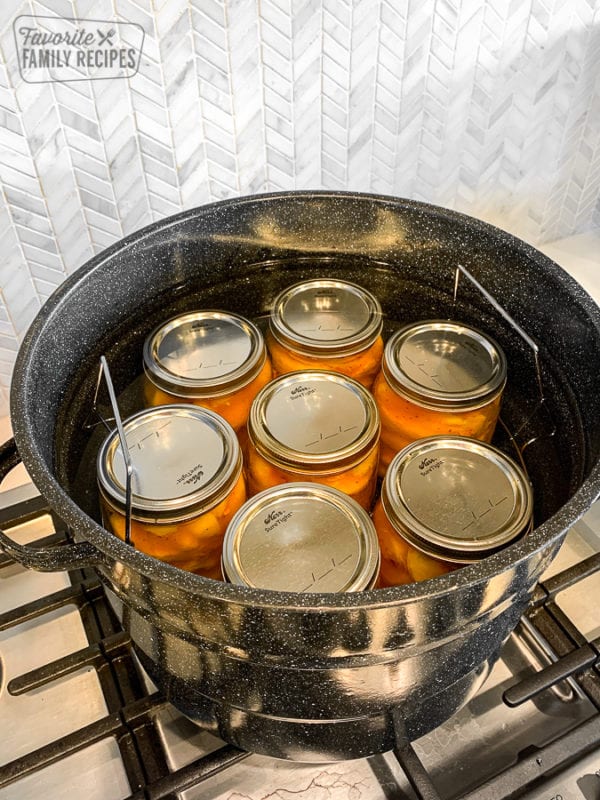
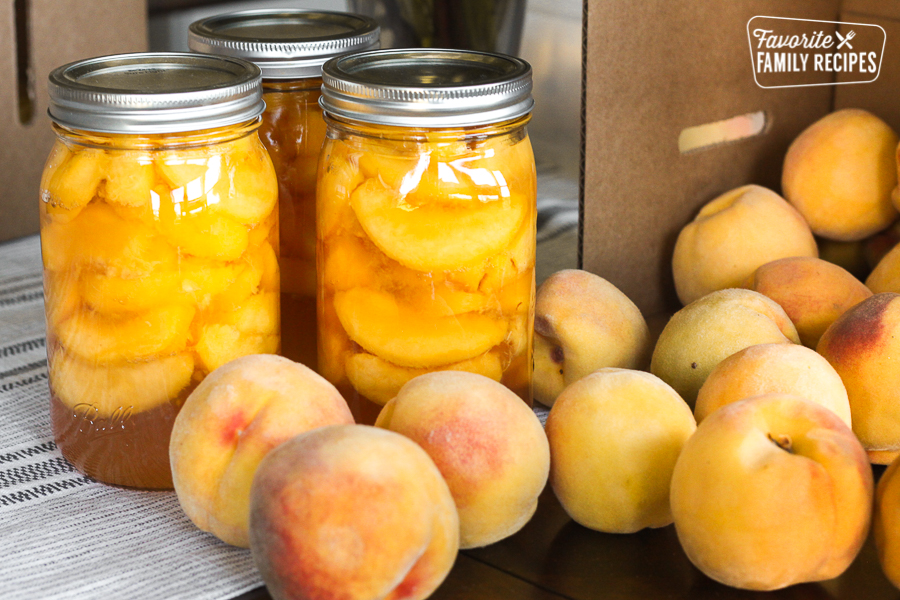
Tips For Canning Peaches
- To prevent browning, toss your peeled, sliced peaches with Fruit Fresh or a lemon juice mixture before canning (see how in recipe below).
- Blanch your peaches to easily peel peaches. Use a knife to easily pull the peels away from the fruit.
- Add a little lemon juice to each jar before adding the peaches to ensure you reach safe ph acidity levels for canning.
- Halved peaches take up for space in the jars than sliced. If you are planning on halving your peaches you may need to use more jars.
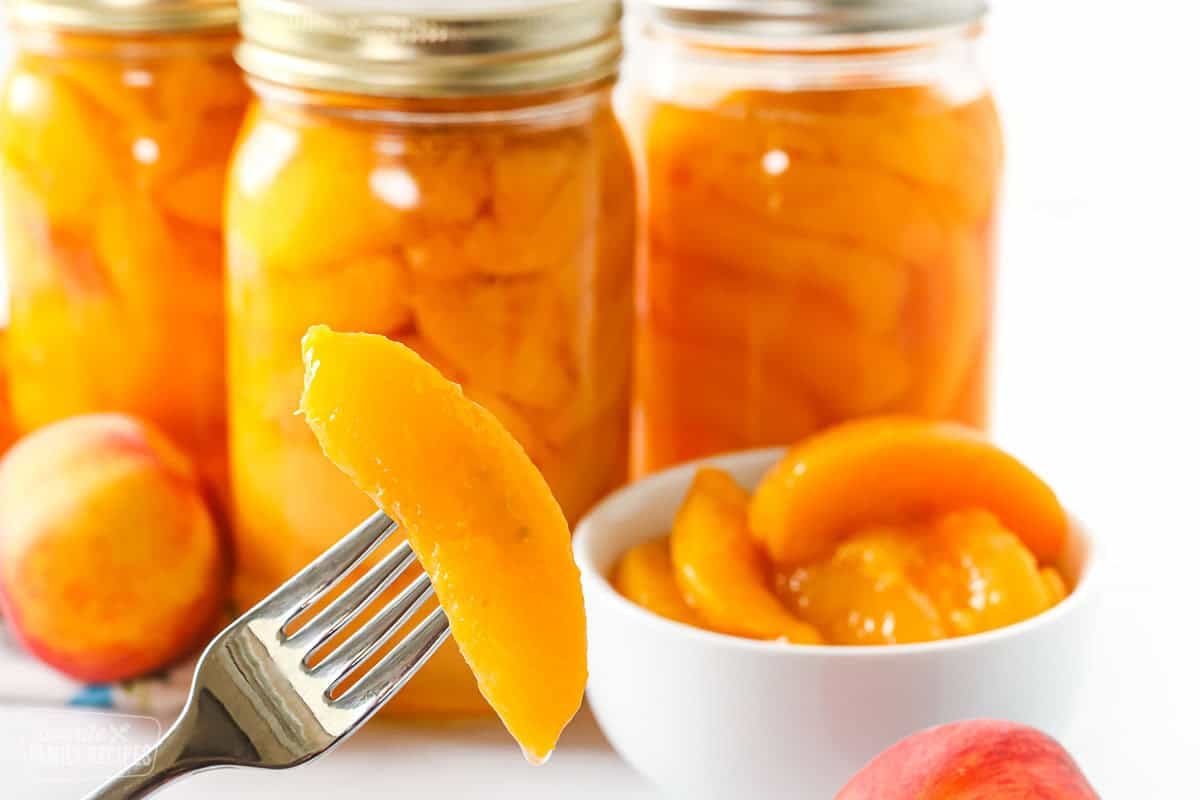
Questions About Canned Peaches
The USDA states that home canned goods last for 1 year. High acid fruit lasts longer, but to be safe, it is best to enjoy within 1 year.
If your peaches aren’t packed tightly enough, they may float to the top of the jar. Don’t worry, this does not affect the taste or the shelf life of the peaches. It may not look as pretty but your peaches are totally fine.
Peaches can turn brown from the cooper or iron used in cooking utensils. The browning could also be due to oxidation from air at the top of the jar or by not enough heating to destroy the enzymes that cause this browning. In these cases, the peaches are perfectly safe to eat.
If the peaches have browned because they aren’t good anymore, you’ll know by smelling them. They will smell fermented, cheesy, or alcoholic. If this is the case, the peaches are not safe to eat.
More Home Canning Recipes: How To Make & Can The Best Homemade Tomato Juice, Homemade Canned Spaghetti Sauce and Virginia Chunk Sweet Pickles.
Recipes Using Peaches
- Peach Pie – This Peach Pie is out-of-this-world good! It’s made with the perfect pie crust and the best peach pie filling you have ever tried. Trust us, you’ll never be satisfied by a store-bought peach pie again!
- Peach Lemonade – You will love how simple this peach lemonade is. You can be enjoying your delicious drink in just a few minutes. The best part is: no lemon squeezing!
- Raspberry Peach Cobbler – Raspberry Peach Cobbler is a tasty treat, a delicious way to use fresh summer peaches and raspberries. So simple to make, with only five ingredients!
- Peach Galette – This Peach Galette is a warm, rustic dessert that is so simple to make. You will love the flaky crust and the sweet filling.
- Peach Freezer Jam – this peach jam has fresh raspberries in the mix and is so tasty!
- Fruit Salsa – this is a fresh mix of peaches, apples , bananas, and berries. Served with cinnamon chips.
How to Can Peaches
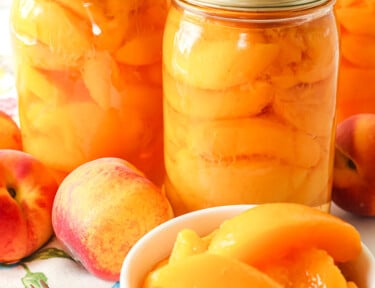
Canning Peaches at Home
Video
Equipment
- 6 Sterilized Glass Quart Canning Jars and Lids (wide-mouth jars are easiest to use)
- Magnetic Lid Wand or Fork
Ingredients
- 30 ripe peaches large
- 1/2 cup lemon juice
- 12 cups water
- 6 cups sugar
- 1/4 cup Fruit-Fresh
- 6 tablespoons lemon juice
Instructions
Prepare for Canning
- Sterilize canning jars by running them through a cycle in the dishwasher.
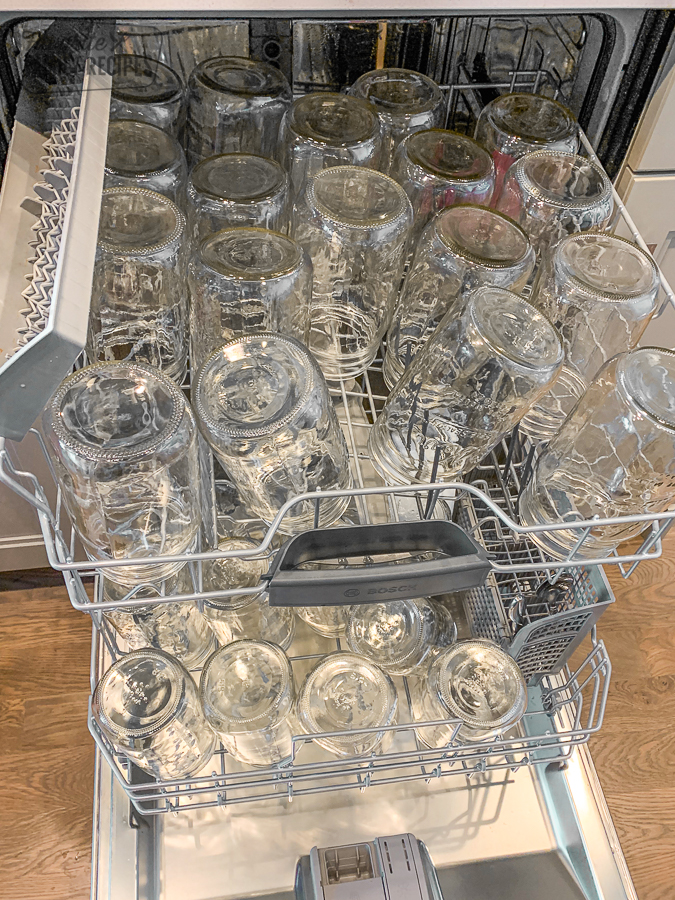
- Place the canning lids in a large saucepan of hot water and simmer until ready to use.
- Prepare a large pot of water and bring it to a boil on the stove.
- Fill the sink with cold water, or prepare a large bowl of ice water.
- In another large pot, combine the 12 cups of water and 6 cups of sugar. Stir to dissolve the sugar and bring to a boil. Remove from heat. Add ¼ cup Fruit-Fresh and set aside for later.
Prepare the Peaches
- Carefully place several peaches in the large pot of boiling water. All peaches should be totally covered by water.
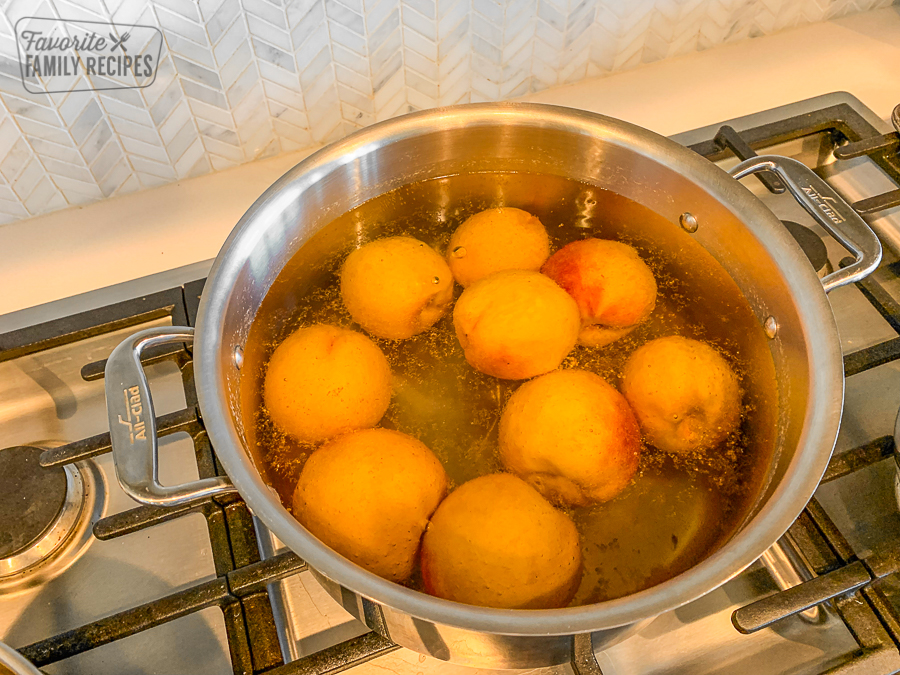
- Set a timer for one minute. Remove the peaches from the boiling water and place them in the sink filled with cold water, or in an ice water bath. Repeat this process until all the peaches are in the cold water.
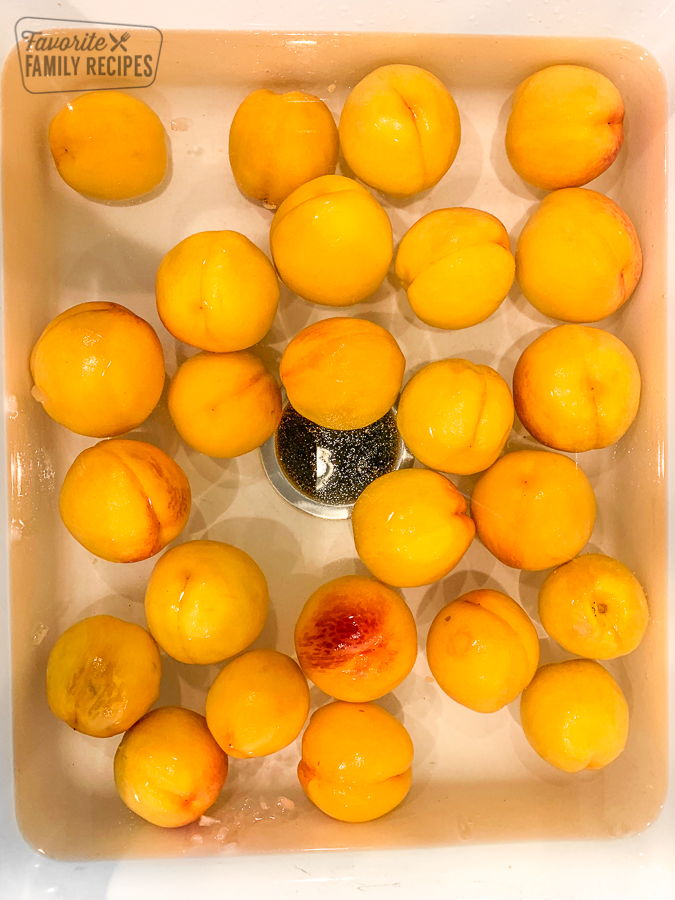
- Add 1 quart of cold water and ½ cup of lemon juice to a large bowl. At this point, peeling the peaches should be easy. The peach skins should slide off without even using a knife. If the a peach is less ripe, it may require a little peeling. Cut the peaches in half or slice them and remove the pits.
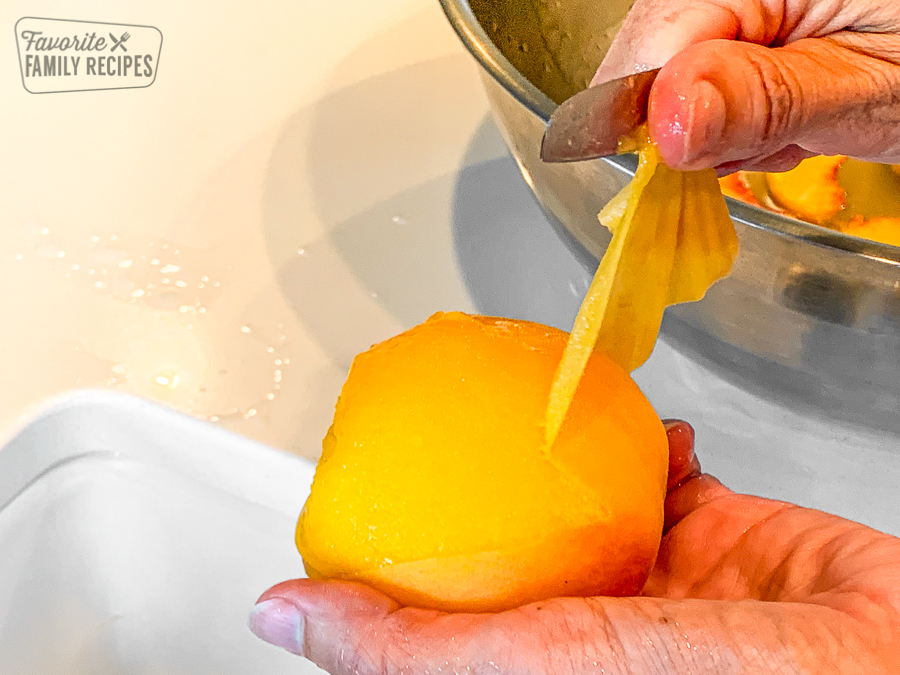
- Place the halved or sliced peaches in the large bowl filled with water and lemon juice. Stir the peaches into the water and lemon juice as you slice them to avoid discoloration.
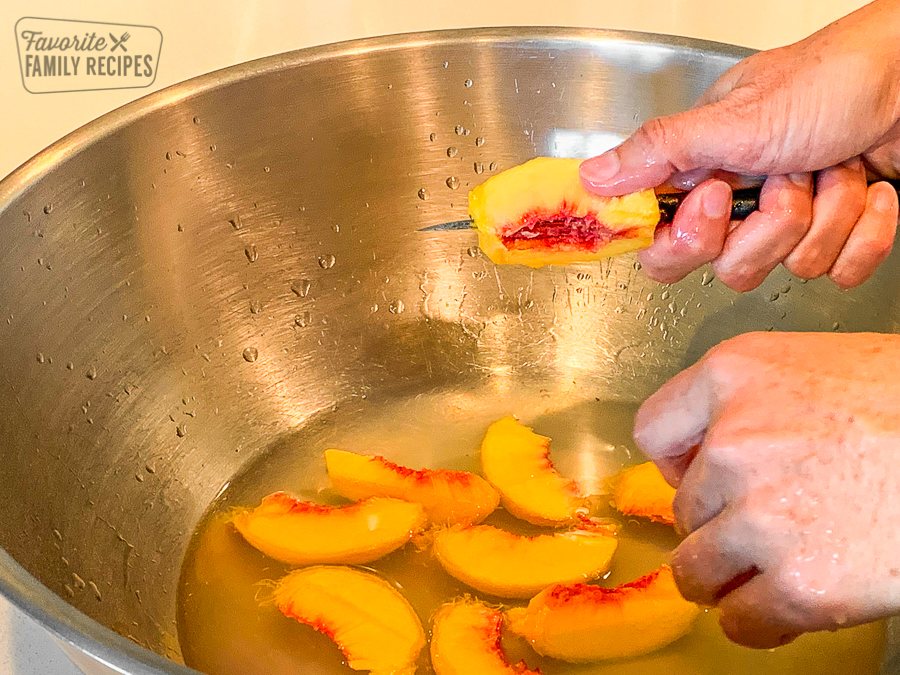
Canning the Peaches
- Place the sterilized jars right side up on a large cookie sheet. This helps keep spills to a minimum.
- Pour 1 cup of the light syrup into each jar. Fill each jar with the halved or sliced peaches. Use a slotted spoon or ladle to remove peaches from the bowl of lemon water. Leave ½ inch headspace at the top of each jar.
- Add more syrup to fill the empty spaces between the peaches and to cover the fruit. There should still be ½ inch unfilled space at the top of each jar. You will likely have some light syrup left over after filling the jars.
- It's important to get all of the trapped air bubbles out of the jar before it seals. Slide a clean knife down the inside of the jar in four or five places to release the bubbles. Clean any liquid from the rims of the jars with a clean towel before placing the heated lids on the jars.
- Use a magnetic lid wand or fork to carefully remove a canning lid from the simmering water on the stove. Do not dry it or touch the lid with your bare hands. It will be hot and you don't want to contaminate it. Place it directly on the top of the jar as pictured. Tighten the screw bands firmly on each jar.
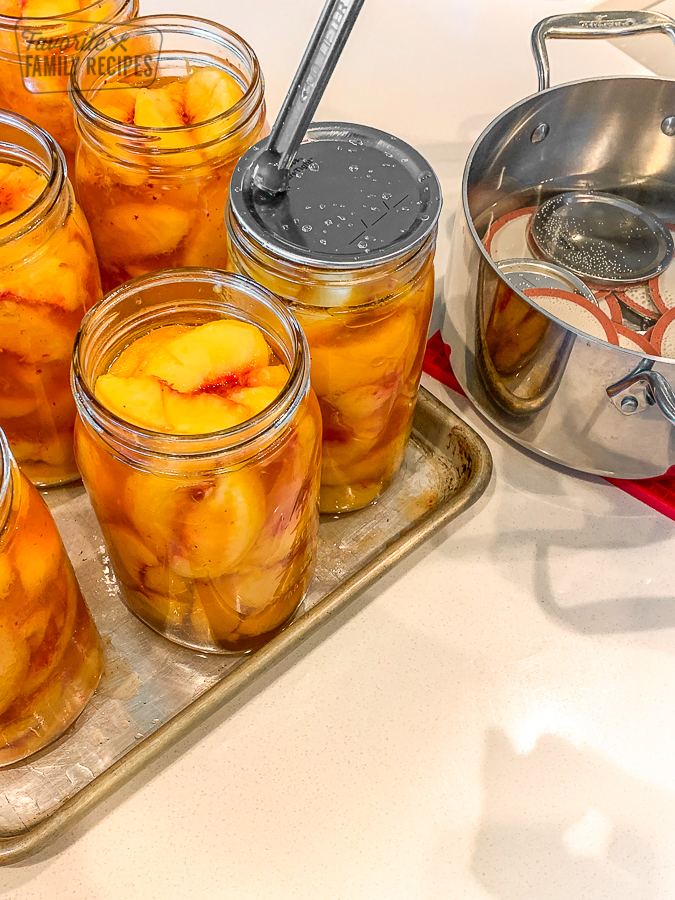
Processing the Peaches
- Fill a water bath canner ½ full with warm water. Place the jars on the wire rack and lower the jars into the canner. Add more water to cover the jars with 1 inch of water above the jars.
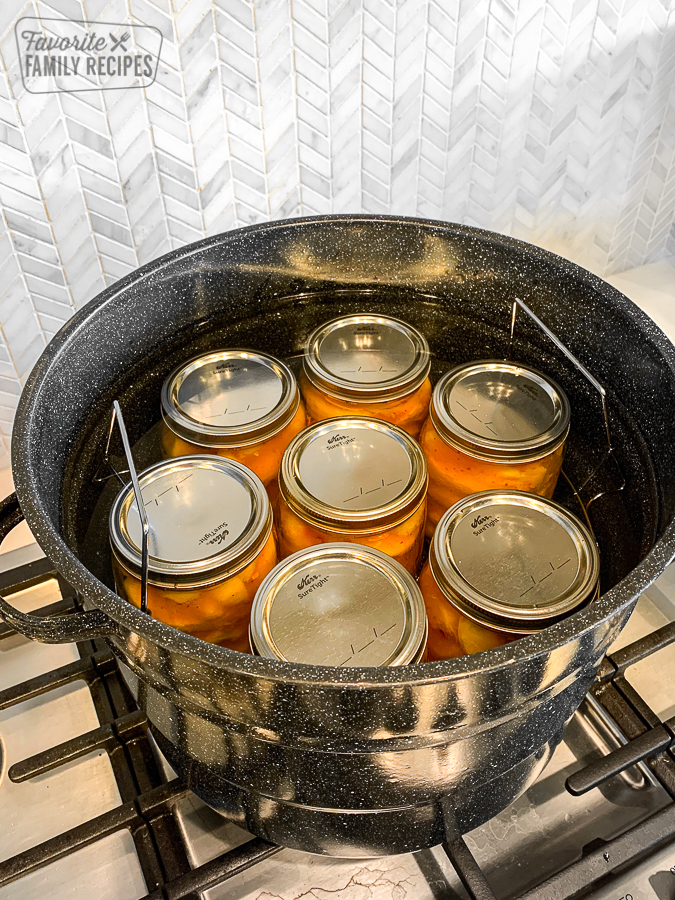
- Cover with a lid, and watch for it to boil. Once it reaches the boiling point, reduce to a medium to medium-high heat. The water should still be boiling, but not at a raging boil that makes a sauna in your kitchen and a mess on the stove. Set a timer for 25 minutes for elevations of 0-1,000 feet (Check exact processing times for your elevation on the National Center for Home Food Preservation website).
- When the time is up, remove the jars from the boiling-water canner and let them cool on a counter in a non-drafty area.
- Once jars have cooled, make sure they have sealed properly and store them in a cool, dark place.
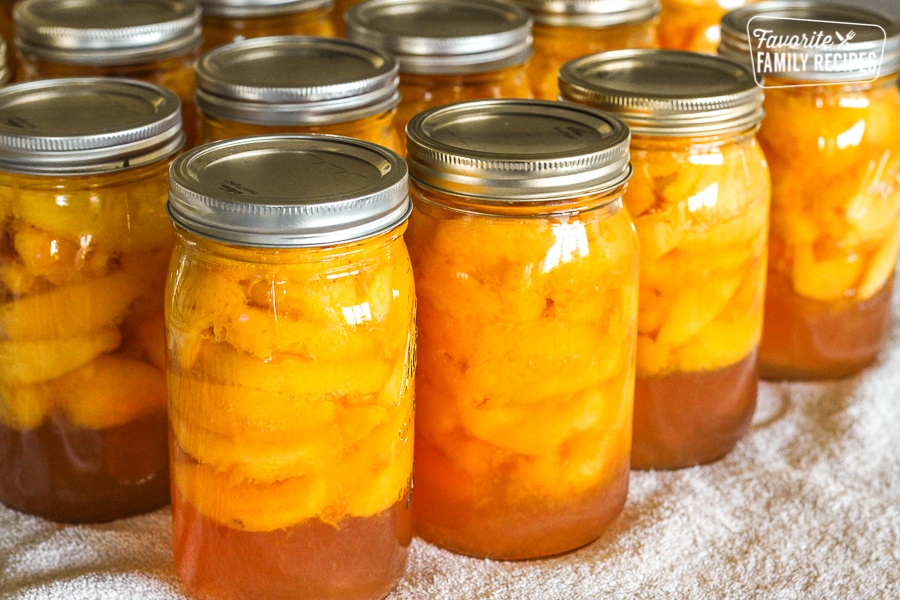
Notes
Recipe Tips:
- To prevent browning, toss your peeled, sliced peaches with Fruit Fresh or a lemon juice mixture before canning (see how in recipe below)
- Blanch your peaches to easily remove the peels. Use a knife to easily pull the peels away from the fruit.
- Add a little lemon juice to each jar before adding the peaches to ensure you reach safe acidity levels for canning.
- Halved peaches take up for space in the jars than sliced. If you are planning on halving your peaches you may need to use more jars.
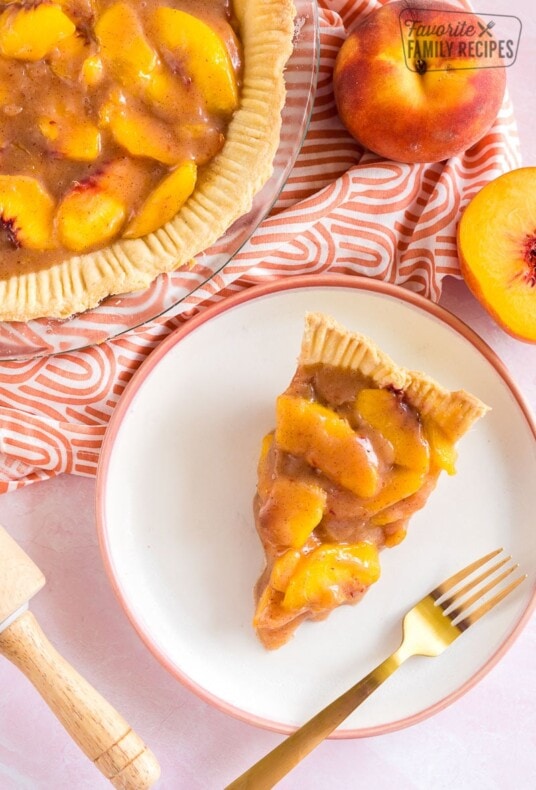
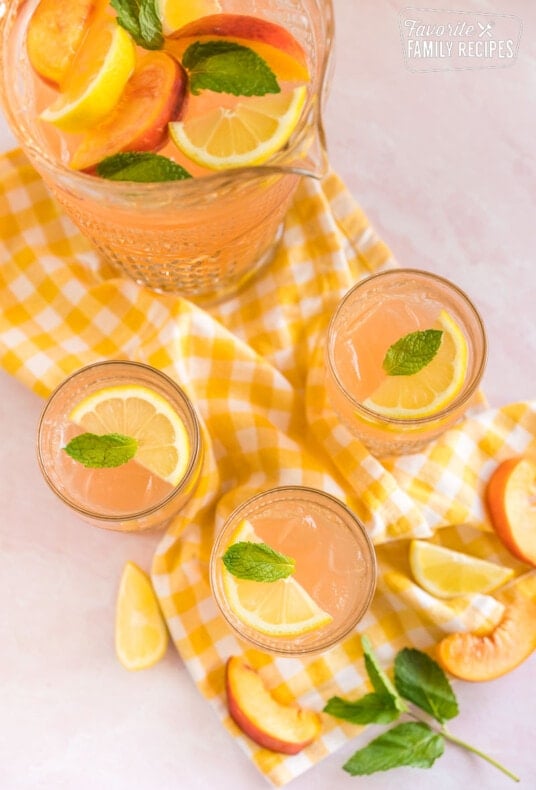
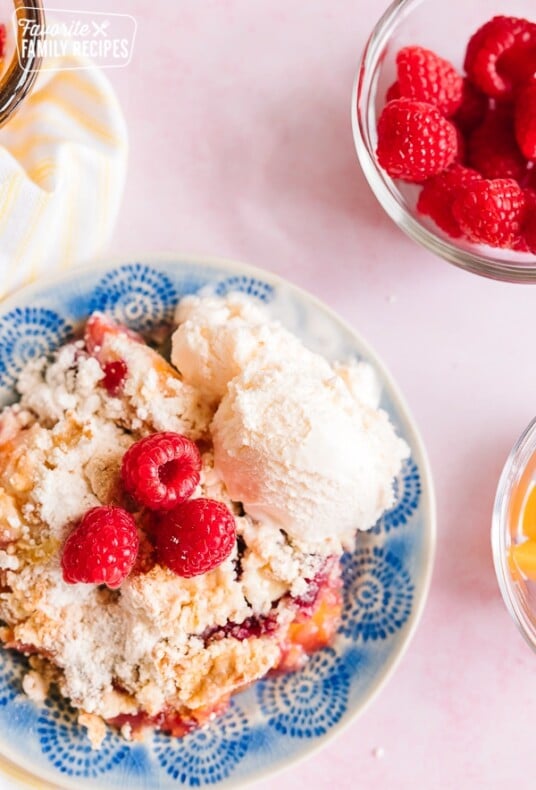
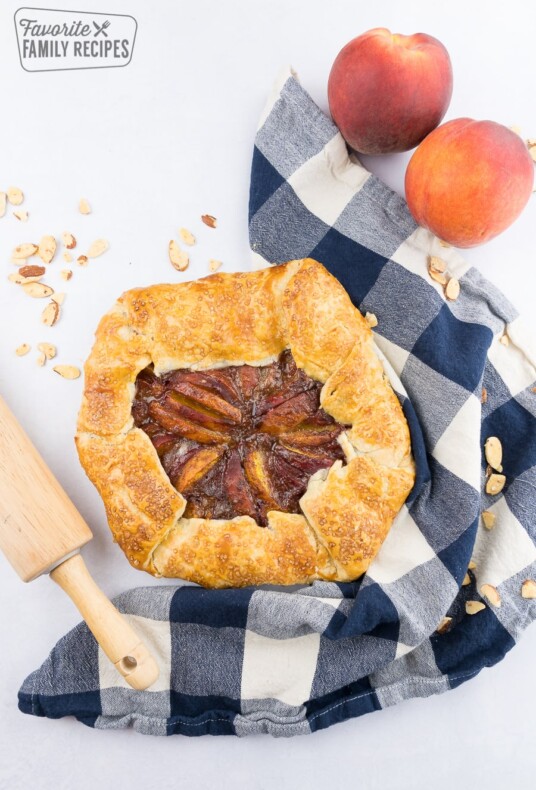
I love canning and was so excited to do this with peaches. They have stayed so fresh and delicious! This is definitely something I will be doing every year!
I would like to use less sugar. How much less can I use?
Thanks in advance.
Patti
You can go down to a 30% ratio of sugar to water, but keep in mind that sugar is the preservative so don’t go less than 30%. The best way to use less is to slice your peaches thinner and add more peaches to each jar. The peaches take up more space, and you will need less syrup to fill the jar. You can also use honey instead of sugar. Use 3/4 cup honey in place of 1 cup of sugar. Keep the water the same. So, in this recipe, that would be 4 1/2 cups honey and 12 cups water. Thanks for asking!
Hello,
I have beautiful white peaches. Can I still use your recipe?
White peaches can differ in pH from other peaches, so I can’t suggest using this canning recipe for safety reasons.
I get wonderful results with no sugar. Just water and a bit of lemon juice.
I never use sugar. Just water and a bit of lemon juice. Process normally. I’m in the middle of canning a bushel right now. They are so beautiful.
I am thrilled I found your recipe before canning my peaches. Your sugar to water ratio is much different than most I have found online. I am looking for a sweet peach but not an over sweet thick syrupy peach. Years ago. I canned peaches in a light syrup and they just tasted watery to me. Is this a better ratio for me??
I pray I hear from you soon as my peaches are coming this week!! Thanks so much!!
I think you will like this ratio. It may depend on the variety of peach you use, but if you use Alberta peaches this ratio is perfect! Good luck!
Hi, there! First time peach canner here. :o) Can I use a light syrup using honey instead? If so, would I follow the same 12 cups water and 6 cups honey? And, would the amount of lemon juice I use change? I can’t wait to try this!
Hi Allison, You can use honey. Honey is sweeter than sugar, so only use 3/4 cup honey in place of one cup of sugar. Keep the water and lemon juice amounts the same. So, 4 1/2 cups of honey and 12 cups water. Thanks for asking!
I followed your recipe…and found the flavor of the canned peaches was not real tasty and they are very soft. Could I have over processed them or left them in the lemon water solution too long. Im wanting to can more this year, and would like a yummier peach taste. Any advice?
Thank You!!!! 😊
Your peaches could have started off too ripe or they could have been over-processed. As far as the flavor goes, that comes down to the peaches. Did you happen to try one before you canned it? If your peaches aren’t very flavorful or over-ripe, they won’t can well. What kind of peaches did you use? That could have contributed to the lack of flavor as well. Sorry it didn’t turn out for you this time!
Could Splenda be substituted for sugar?
We haven’t made it with Splenda before but a quick Google search brought up a result saying “A research study by the University of Georgia concluded that peaches canned in either full-strength medium Splenda® syrup or half-strength medium Splenda® syrup is suitable for home canning peaches” Hope this helps.
So delicious! This is my favorite way to eat peaches! Home-canned. Thanks for the step by step directions.
Peach season is hands down my absolute favorite. I need to do this next year so I can enjoy them all year round, thanks for the awesome info!
You could definitely turn the mushed peaches into jam. If the peaches taste good on a spoon, they’ll taste great on toast! Jam only needs to cook for about 5 minutes using certo or similar pectin. Peaches are naturally very sweet so I would recommend using a no sugar pectin but add one to two cups of sugar per 5-6 cups of fruit depending on what the recipe on the box calls for. Then process for 10 minutes.(depending on your elevation).
I just tried to make the peach slices….I tried taking them out of the boiling water after a minute and put them in a cold bath, but they weren’t peeling well so I put most of them back in the boiling water. Big mistake, they are completely mushy now. I managed to have enough for 3 jars of sliced peaches but now I have a pot full of mushy peaches. Can I somehow turn these into peach jam or peach pie filling?
Any help would be appreciated, thanks
Oh shoot! I’m sorry that happened! I would probably just freeze them and add them to smoothies.
Make peach butter!!!!
First time canner here, and your recipe made it so easy! Very detailed in a great order. Did it with my 9 year old daughter and now we can’t wait to eat a jar. I didn’t know canning could be so easy! Thank you!
Can I use these peaches for peach cobbler? Would I use the juice in the cobbler too!
I enjoy baking peach pies the most. I am thinking this canning process is not what I would use right?
I am a beginner canner as well. Thank you for this well detailed canning!!
Absolutely! These peaches are delicious in cobbler. If the recipe calls for fresh peaches, drain the juice and just use the peaches.
What happens if they don’t seal properly? do you have to get new lids to bath again or do you can use the same lid?
I would use new lids if re-processing.
how long for pints in water bath
If you are doing pints, you only process for 5 minutes less than the time suggested for quarts, so 20 minutes for elevations 0-1,000 feet. Hope this helps!
Hi Erica! For pints, what other aspects / measurements / amounts change if using pints? I have 24 peaches I’ve set aside. Also a first time canner here! Thanks in advance!
For pints, the only difference is that you reduce the processing time but 5 minutes. Not a huge difference but it can keep your peaches from getting overcooked while processing. Hope this helps!
Thank you so much!!
Hi! I did the cold pack method…after 25 minutes in the hot bath, now cooling, I’m noticing the syrup is at least a 1/2” below the jar rim. So not all peaches are in syrup.
The peaches are floating. What can I do??!
Can I wait til they are totally cooled, add more boiling syrup and water bathe them again? Thanks for your help!!! 😊🍑🍑🍑
It’s ok if the peaches are above the syrup. That is normal. It is actually called “fruit float” and it is very common. It doesn’t affect the taste or the shelf life. It may just not look as pretty. Hope this helps!
Hi! First timer here. I like your recipe’s ease.
What might the shelf life be with this method?
Thank you!
I try to eat everything that gets canned within a year!
Thank you for your response!!!
Be well and safe!!! 😊🍑
This is easier than I thought. They look delicious and I love that I can have peaches for months.
I’ve been waiting for peaches to go on sale so that I can stock up. I can’t wait to try canning them. Thank you for the detailed instructions!!
These are so great – perfect way to make the most of seasonal produce to enjoy all year round.
There is nothing so pleasing as making yummies with peaches. The right peaches are soft, sweet and oh my – absolutely delicious! I can’t wait to can as many as possible!
It must be wonderful to open up one of those jars in the winter. A little bit of sunshine.
I love your site and make many of your recipes. I just wanted to make a comment about this recipe, as canning recipes need to be more accurate than most. According to the USDA complete Guide to home canning, the processing time of 25 minutes for quart size jars of peaches is only recommended if done hot pack at elevation levels of 0-1000 feet. Higher elevations require longer cooking times. It looks like your recipe is Raw pack and at my elevation of 5600 ft., the recommended processing time is 40 minutes. It would be great if you mentioned the need for altitude adjustments in your post as a food safety measure.
Thank you for catching this. I changed it on the recipe and added a link for processing times.
Yes!!! Excellent point!